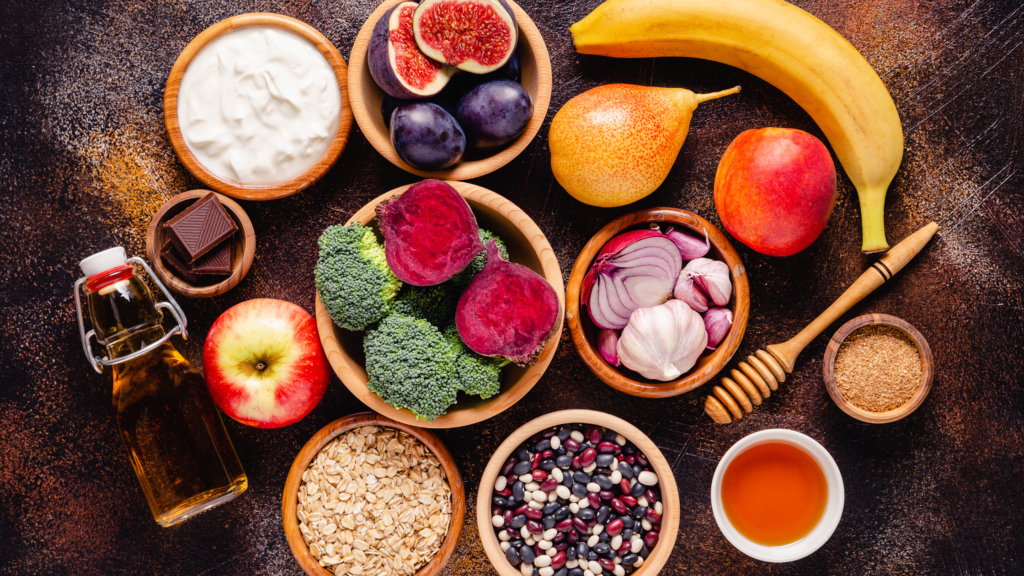Maintaining a happy gut is key to overall wellness – from smooth digestion to a strong immune system and even a good mood. If you’ve been experiencing bloating, indigestion, or other tummy troubles, you might be curious about the best supplements for gut health and digestion. With so many probiotic pills, powders, and potions on the market, it’s easy to feel overwhelmed. In this deep dive, we’ll break down some of the top gut health supplements, explain how they work, and look at what science says about their effectiveness. We’ll also highlight a few example products (including a popular one from Boldfit) to illustrate what to look for. Let’s nurture that gut of yours!
1. Probiotics – Friendly Bacteria for Your Gut
Probiotics are probably the first thing that comes to mind for gut health. These are supplements containing live beneficial bacteria (and sometimes yeasts) that can help balance your intestinal microbiome. The idea is that by taking probiotics, you add more “good guys” to crowd out harmful microbes and improve digestion.
What science says: There’s a decent amount of evidence supporting certain probiotics. For example, a 2018 review of 53 studies found that probiotics may alleviate symptoms of irritable bowel syndrome (IBS), such as bloating and irregular bowel movements. Specific strains have been shown to help with antibiotic-associated diarrhea and even some aspects of immune function. That said, not all probiotics are equal – effects can be strain-specific and some conditions respond better than others. We’re still learning which strains and doses are ideal for each issue. Overall, many people do report improved digestion and regularity when taking a quality probiotic.
What to look for: When choosing a probiotic, consider the CFU count (colony forming units – essentially the number of live microbes) and the diversity of strains. A good product often has a variety of well-studied strains like Lactobacillus and Bifidobacterium species. For general gut health, a multi-strain probiotic in the range of 10–50 billion CFU daily is common.
Example Product: Boldfit Probiotic Supplement – This popular supplement provides 30 billion CFU and 16 probiotic strains per serving. It’s formulated for both men and women to support digestion and immunity. A product like this contains a broad mix of Lactobacillus and Bifidobacterium strains, which is great for covering different areas of the gut. Users often take one capsule per day. Remember, consistency is key – probiotics only help while you take them, so you need to make it a routine. Also, storing them properly (some need refrigeration) ensures those friendly bugs stay alive.
Tip: If you’re new to probiotics, start with a lower dose and work up to avoid any transient gas or bloating as your gut adjusts. And don’t be discouraged if one brand or type doesn’t work for you – sometimes trying a different strain combo can make a difference.
2. Prebiotic Fiber – Food for Your Good Gut Bugs
While probiotics add beneficial organisms to your gut, prebiotics feed the beneficial bacteria you already have. Prebiotics are typically various types of fiber or resistant starch that humans can’t digest, but our gut bacteria can. By nourishing your good bacteria, prebiotic supplements can indirectly improve gut health and digestion.
Common prebiotic supplements include inulin (from chicory root), FOS (fructooligosaccharides), and PHGG (partially hydrolyzed guar gum). You’ll also find prebiotic fibers in foods like bananas, garlic, onions, asparagus, and oats.
What science says: A diet high in fiber is strongly linked to a healthier gut microbiome and better digestive function. Prebiotic fibers can increase beneficial bacteria (like Bifidobacteria) in the colon. This can lead to improved bowel regularity and production of beneficial short-chain fatty acids (like butyrate) that keep the colon lining healthy. For instance, studies have found that inulin supplementation can promote more frequent bowel movements in people with constipation. Prebiotics may also help with reducing bloating by balancing gut flora, though if taken in excess they might initially cause some gas (as bacteria ferment them).
How to use them: If you don’t get a lot of fiber from your diet, adding a prebiotic supplement can be helpful. You might try a psyllium husk supplement (like the popular Metamucil) – psyllium is a fiber that acts in part as a prebiotic and also adds bulk to stool, easing constipation. Another approach is a prebiotic powder (for example, one containing inulin or FOS) that you can mix into water or a smoothie. Start slow – maybe 1/2 teaspoon – and increase to the recommended dose over a week or two. This helps your gut bacteria adjust and prevents excessive gas. Prebiotics pair well with probiotics (some supplements even contain both, called “synbiotics”). Essentially, think of prebiotics as fertilizer for your gut garden. With regular use, they can help your existing good microbes thrive, leading to better digestion and even absorption of minerals.
3. Digestive Enzymes – Helping Hands for Digestion
Your body produces its own digestive enzymes to break down food, but sometimes supplementation can assist, especially if you have specific insufficiencies. Digestive enzyme supplements typically contain enzymes like amylase (to break down carbs), protease (for proteins), lipase (for fats), as well as specialty ones like lactase (to help digest lactose in dairy) or alpha-galactosidase (the Beano® enzyme that helps reduce gas from beans).
People who might benefit from enzyme supplements include those with lactose intolerance (taking lactase drops or pills allows them to enjoy dairy) or those with pancreatic insufficiency (who need prescription enzymes). There are also broad-spectrum enzyme supplements marketed to help with general post-meal bloating or discomfort.
What science says: For individuals with enzyme deficiencies, these supplements can be game-changers. For example, lactase supplements prevent symptoms of lactose intolerance by breaking down lactose. Prescription-strength pancreatic enzymes significantly improve nutrient absorption in people with pancreatitis or cystic fibrosis. But what about otherwise healthy people with occasional bloating? Here, the evidence is a bit mixed. According to experts, most healthy people don’t need extra enzymes and there’s limited proof that over-the-counter enzyme blends do much if you don’t have a specific deficiency. A Harvard Medical School article noted that for most people, there’s “little evidence that they do any good” for common bloating or indigestion. However, some small studies have shown benefits – for instance, a blend of enzymes might help with functional dyspepsia (upper stomach discomfort) or gas in some cases.
Expert tip: If you suspect certain foods always upset your stomach (e.g., high-fat meals, or beans causing gas), a targeted enzyme might be worth a try. For example, alpha-galactosidase before a bean-heavy meal can reduce gas. Or if you feel heavy after a big protein meal, a protease supplement could, in theory, help break it down faster. Just keep in mind that any enzyme supplement is supplementing what your body already does. Johns Hopkins gastroenterologists emphasize that most people’s bodies make plenty of enzymes, and supplements are most useful for those with insufficiencies. Also, quality matters – look for reputable brands because enzymes are not well-regulated (they’re considered supplements, not medicines). If you don’t notice any benefit after a trial, you likely don’t need them.
In short, digestive enzymes can be very effective for specific digestion problems (like lactose intolerance or pancreatic enzyme deficiencies) and may provide mild help for general bloating in some individuals. But they are not universally needed.
4. L-Glutamine – Fuel for Gut Lining Repair
L-Glutamine is an amino acid (a building block of protein) that is a favorite in gut health discussions. The cells of your intestinal lining actually use glutamine as a primary fuel source. The idea is that supplementing glutamine could help strengthen the gut barrier (often referred to in pop culture as “healing a leaky gut”) and support the intestinal immune system.
What science says: In clinical settings, glutamine has been used to help patients recovering from serious illnesses or injuries to protect gut function. There’s evidence it can reduce intestinal permeability (meaning it helps seal the gut lining) in certain situations. Some research suggests that glutamine may help manage IBS symptoms – a recent update notes that glutamine supplements might improve IBS-related gut permeability and reduce symptoms in some people. It’s not a guaranteed cure by any means, but a small 2019 study found IBS patients with diarrhea who took glutamine had improvements in bowel symptoms compared to a placebo. For otherwise healthy folks, glutamine is generally safe and your body usually has enough, but stress or intense exercise can deplete it.
If you have a condition like IBS, IBD (Crohn’s, colitis), or just want to support your gut lining (say you’ve had long bouts of digestive distress), glutamine could be worth discussing with your healthcare provider. A common dose is 5 grams taken on an empty stomach, once or twice daily.
Expert insight: The Cleveland Clinic notes that glutamine helps strengthen the cell barrier in the gut and maintain a healthy intestine. However, they and others also caution that for healthy people, extra glutamine might not make a significant difference – it’s more about situations where your gut is under stress. So, while glutamine is not a must-have for everyone, it falls under “might help and likely won’t hurt” for gut health. If you decide to try it, make sure to get pure L-glutamine powder or capsules from a reputable brand.
5. Herbal Digestive Aids (Peppermint & More) – Nature’s Soothers
Nature offers some great supplements for digestion in the form of herbal remedies. A standout here is peppermint oil, which has a solid evidence base for easing IBS symptoms. Enteric-coated peppermint oil capsules have been shown to relax the intestinal muscles, reducing spasms, pain, and bloating in people with IBS. In fact, a comprehensive meta-analysis concluded that peppermint oil is a safe and effective therapy for pain and global symptoms in adults with IBS. Many gastroenterologists recommend peppermint oil capsules as a first-line supplement for IBS patients dealing with cramps.
Other helpful herbs/carminatives include ginger (excellent for nausea and can help stomach emptying), fennel (often used to relieve gas and cramping), and chamomile (soothing for the GI tract). You’ll find these in teas or in supplement form. For example, ginger capsules are popular for motion sickness or pregnancy-related nausea and have strong scientific support for those uses.
What science says: Peppermint oil has perhaps the strongest data for IBS. Studies have found it significantly improves abdominal pain versus placebo. It works by relaxing the gut’s smooth muscles and possibly by an anti-pain effect. Ginger has a long history of use and research backing its anti-nausea properties (for seasickness, post-surgery nausea, etc.). It also has anti-inflammatory effects in the gut. Fennel has some small studies suggesting it can help with mild indigestion and IBS bloating (sometimes it’s combined with turmeric or other supplements).
While these herbs might not directly “make you live longer,” they improve digestive comfort, which in turn can improve nutrient absorption and quality of life – important indirect factors for health. They tend to have fewer side effects compared to pharmaceuticals for similar issues.
How to use: If you have IBS with abdominal pain or spasms, an enteric-coated peppermint oil capsule (usually 1-2 capsules of ~0.2 mL each) before meals can help. (Enteric-coated means it survives stomach acid and releases in the intestines where it’s needed.) For general digestion support, sipping on a warm cup of ginger-peppermint tea after a meal can stimulate digestion and reduce gas. You can also find combination supplements that include multiple herbs and even enzymes (some “digestive bitters” or Ayurvedic supplements).
Herbal supplements can be potent, so follow dosing instructions. If you’re on medications or have health conditions, double-check with your doctor to ensure no interactions (for instance, high doses of peppermint oil might aggravate acid reflux in some people because it can relax the esophageal sphincter).
What About “Leaky Gut” Supplements and Others?
In the wellness market, you might see supplements that claim to “heal leaky gut” or otherwise revolutionize your microbiome – ranging from collagen powders to oregano oil to soil-based probiotics. Here’s a quick take:
Collagen: Collagen is a protein supplement often used for skin and joints, but some suggest it helps the gut lining because it contains amino acids like glycine and glutamine. While collagen is nutritious, it’s not a magic bullet; if it helps your gut, it may be due to those amino acids which you could also get from a balanced diet or a specific glutamine supplement.
Oregano oil and herbal antimicrobials: These are sometimes used to address bacterial overgrowth (like SIBO). Oregano oil is a natural antimicrobial – it can kill bacteria (including potentially some bad ones in the gut). However, it can also kill good bacteria and isn’t typically used long-term. Such approaches should be guided by a healthcare professional if there’s an identified imbalance.
Soil-based or spore-based probiotics: These are newer types of probiotics (like Bacillus coagulans, for example) that are very hardy. Some people find them beneficial if traditional probiotics haven’t worked, but research is still catching up. Use with care and reputable brands, as always.
The key is: focus on the basics first – probiotics, fiber, maybe targeted enzymes or herbs – before venturing into exotic territory. Often, improving your diet with whole foods (fruits, veggies, whole grains, fermented foods) and managing stress will do more for your gut than a cabinet full of pills.
Conclusion – Building Your Personal Gut Health Stack
When it comes to gut health supplements, it’s not one-size-fits-all. The best supplements for you depend on your specific issues:
If you experience irregularity or recently took antibiotics, a quality probiotic (like Boldfit’s multi-strain probiotic) could help repopulate your gut with beneficial bacteria.
If you know you don’t get enough fiber, try a prebiotic fiber supplement to feed your microbiome – your gut bugs will produce beneficial compounds that improve digestion and immunity.
Struggling with certain foods? A digestive enzyme targeted to that food (lactase for dairy, etc.) can make a huge difference. Just remember that for most people, broad enzyme supplements might not dramatically change things unless a slight deficiency is present.
Issues like IBS: consider peppermint oil for symptom relief and possibly L-glutamine to support your gut lining, as research suggests benefits in these areas. And don’t forget the power of stress reduction – practices like yoga or mindfulness can actually improve IBS symptoms by calming the gut-brain axis!
Before starting any new supplement, it’s wise to discuss with a healthcare provider, especially if you have ongoing gastrointestinal conditions or are on medication. Supplements can complement a healthy diet, but they shouldn’t replace one. Focus on eating plenty of fiber-rich foods (vegetables, fruits, whole grains), staying hydrated, and chewing your food well – these simple habits work wonders for digestion.
Finally, listen to your body. The “what science says” for each supplement gives a general idea, but individual responses vary. You might find that a certain probiotic strain makes you feel fantastic while another does nothing – and that’s okay. It may take some experimentation to find your perfect gut health routine.
CTA: Ready to give your gut some love? Start by picking one supplement that aligns with your needs (for example, a probiotic for overall balance or a peppermint oil capsule for post-meal comfort) and introduce it for a few weeks. Track how you feel in a journal. And remember, supplements work best alongside a gut-friendly lifestyle – so load up on those colorful veggies and maybe sip some kombucha! Here’s to happy digestion and a healthier you. If you have a favorite gut supplement or remedy, let us know – sharing our experiences helps everyone navigate the journey to better gut health.












